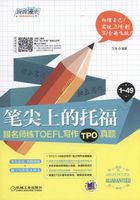
TPO 19
阅读解析与听力预测
总论:
critics认为buzzing应该被禁止。这估计就是阅读要展开的观点了。接下来可能提供理由支持buzzing该被禁止。
理由1:
consumers并不知道这个人其实是被paid来宣传产品的,他们很可能会收到假信息。
理由2:
由于consumers以为buzzers是普通人,所以很可能uncritically听从他们的意见。
理由3:
buzzing会毁掉social relationship,会导致人与人之间失去信任。
听力解析
一堆废话,听到really misleading,终于要开始正题了。gives the wrong impression继续是废话。
First,准备讨论假信息。it makes it sound like buzzers don't tell the true暗示接下来听力要说其实buzzers给的是真信息。That's not true是废话。Companies find people who use their products and…think the product is good,估计要展开为什么是真话了。not like ordinary advertisements where an actress is paid to read some lines体现了和虚假广告的区别。yes体现让步;get paid具体说明让步的地方。but you get the truth再次强调他的观点,不用记录。
♦ 本段逻辑梳理:buzzers并不会给出虚假信息。因为,他们不是paidactors纯粹念稿,不知道产品好坏。他们是因为使用了产品觉得好,才被公司雇来做buzzers。
Second,准备讨论uncritical。Not true,说明要直接否定这一点,观众是会critical的。In fact,the opposite is true是废话。People…ask a lot of questions体现了critical。price,service等都是展开的questions,这种细节并列并不需要全部记下来,能写则写,不能写也不影响段落逻辑。If I don't have good answers,they won't buy显然没有什么新意,顺着上文逻辑的发展。
♦ 本段逻辑梳理:本段非常直白,顾客是critical的,面对buzzers,他们会问很多问题,各种各样的问题。
Finally,准备讨论trust。that's stupid,看来是要直接否定destroy trust了。If a product is bad,the company can't recruit buzzers,so what you get from a buzzer is not only sincere but…about a good product,直接表明听了buzzers的建议会买到好东西。If you try the phone service I use,you are gonna love it明显是他用个人的例子展开刚才的观点,属于废话。good experience,end up…trustful and open up to people落到了反驳点上,显然最后不会distrustful,而会更trustful。
♦ 本段逻辑梳理:buzzing反而会加固trust。因为,不好的产品找不到buzzers,所以如果你听了buzzers的话,很可能会买到好的产品,有了好的体验,最后你会更相信他人,人际关系反而更可靠。
满分范文
The article mentions critics' three reasons to argue for the ban on buzzing. However,the buzzer in the lecture denied each of these three reasons.
For starters, the buzzer claims that information from the buzzer is in fact reliable, in contrast to what the article says. Buzzers are not paid actors who just read the lines, he reasoned, but are instead ones who first experienced satisfactory products and then were hired to buzz.
Second, opposite to the article's point of view, the buzzer insists that the consumers are quite critical when they listen to buzzers. In fact, he points out that consumers tend to ask tons of detailed questions, and if they do not receive good answers, they will simply not buy the product.
Last, the buzzer considers it ridiculous that the article thinks buzzing is going to destroy interpersonal trust. On the contrary, he argues that, because bad products won't find buzzers, consumers who listen to buzzers' sincere advice will probably end up enjoying a good product and hence have more faith in other people.